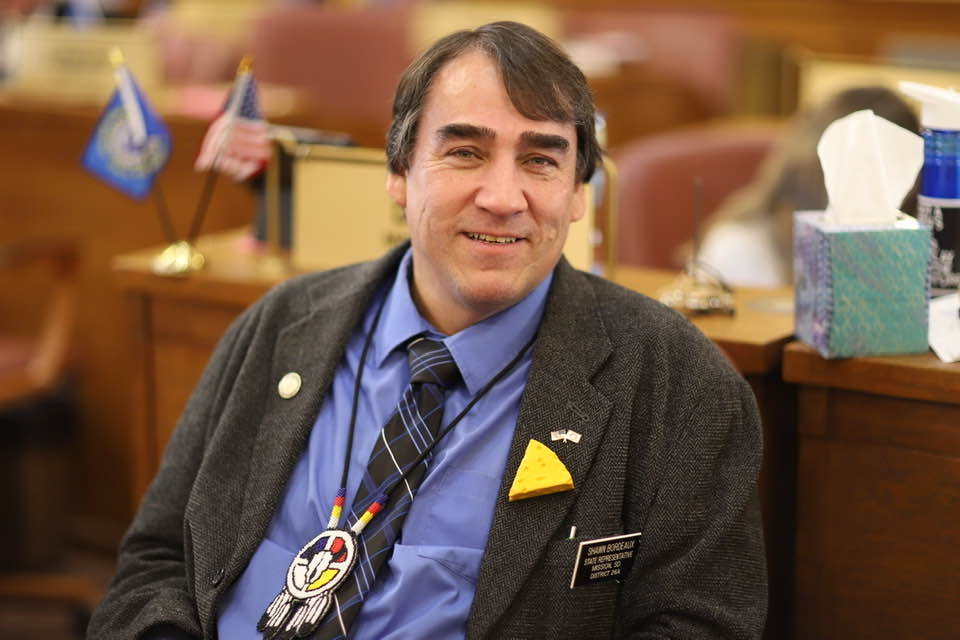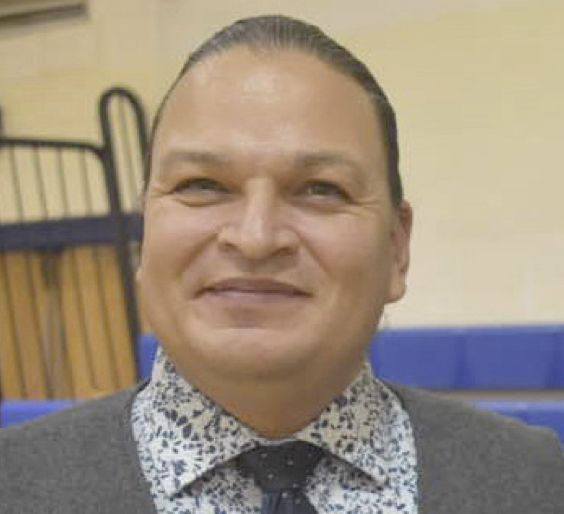Native Americans from South Dakota would be able to hunt or fish anywhere in the state for free and visit or camp in state parks without paying fees under two bills under consideration by the state Legislature.
House Bill 1141 would allow enrolled members of a federally recognized Indian tribe located entirely or partially in South Dakota to be exempt from fees for hunting or fishing licenses, permits or stamps. House Bill 1142 would allow those same tribal members to be exempt from fees to enter or camp in state parks.
Both bills were proposed by Rep. Shawn Bordeaux, D-Mission, a member of the Rosebud Sioux Tribe. Bordeaux said he proposed the state park fee waiver for Natives after seeing that Minnesota had enacted a law waiving park entrance fees for tribal members starting this year. New York state waives hunting and fishing fees for enrolled tribal members, according to state law.
In an interview with News Watch, Bordeaux said tribal members should have free access to state parks and recreation areas once inhabited by their ancestors, as many of those lands retain cultural and spiritual significance among Native Americans. Bordeaux said tribal members should also be allowed to hunt and fish without fees, just as they did before the state was settled by Europeans. Treaties signed between Indian tribes and the federal government generations ago guaranteed such rights, but have been ignored by South Dakota and other states, he said.
“We feel like we should be able to go the state parks because it’s our land, and it was taken from us,” said Bordeaux, an administrator at Sinte Gleska University in Mission. “Is it too much to ask for our Legislature and state to say, ‘OK, we recognize that all this land was yours, so we’re going to make it free to card-carrying Natives’?”
Bordeaux also sees the fee waivers as important to Native Americans in both in a practical and a philosophical sense.
In practice, making park and camp usage free and removing license fees for hunting and fishing would provide a new opportunity for outdoor activities among Native American individuals and families who often struggle financially.
State park entrance fees are $8 daily or $36 annually for one vehicle; camping fees range from $15 to $26 per night. Resident fishing fees are $8 per day or $28 per year; resident hunting fees vary, but common fees are $33 for pheasant and small game and $40 for many deer licenses.
“For a family, it’s really expensive, and these are depressed areas, some of the poorest counties in the nation where we live,” he said. “This would give our kids a chance to get out in a way that is more affordable, and when you’re putting deer as food on your table or your grandma’s table, there’s a real need for this.”
Update: Fee waiver bills rejected by legislative committee
On Feb. 7, 2022, the House State Affairs Committee held a hearing and later voted 11-2 to reject the bills that would have waived fees for South Dakota tribal members to hunt, fish or enter state parks. The state Division of Parks and Recreation opposed the legislation during the hearing.

Bordeaux said the fee waivers would have a very limited impact on state revenues, especially since most Natives already hunt or fish on reservation lands, and because many state parks are far from Native communities. Fiscal impacts would be minimal in the long run but especially at a time when the state coffers are flush with more than $1 billion in federal COVID-19 aid, Bordeaux said.
Officials with the Department of Natural Resources in Minnesota estimate the state park fee waiver there will cost the state only about $25,000 in reduced fee revenue and $2,000 lost in sales-tax collections.
From a philosophical perspective, Bordeaux said waiving the fees would send a strong signal to the Native American population in South Dakota that the state cares about them and supports their rights to visit religious, cultural and recreational sites.
“We feel like it’s not going to cost a whole of money, it’s a nice gesture, and it’s a thing that can go a long ways toward reconciliation to bring our peoples together,” Bordeaux said. “It’s a little carrot, but if it’s the only carrot in your view, it’s substantial enough to see it as something important.”
Both measures have been referred to the House State Affairs Committee, but as of Feb. 1 had not had a hearing.
The South Dakota Department of Game, Fish & Parks, which runs state parks and regulates hunting and fishing, had not taken a position on the two bills as of Jan. 31, according to spokesman Nick Harrington.
State law allows for some exceptions to park-entrance fees, Harrington said, including for disabled veterans or former prisoners of war, who also get half-off camping fees. Some tribal members do not have to pay entrance fees to state parks or recreation areas within their boundaries, including Crow Creek tribal members at West Bend Recreational Area, and Yankton Sioux tribal member at North Point, Fort Randall South, Randall Creek or Fort Randall Spillway recreation areas.
The state Hunting Handbook also notes that state hunting licenses are not valid on reservation lands, and that tribal licenses are not valid on non-reservation lands. Active military and disabled people receive free or reduced fishing access.
Most Indian tribes in South Dakota and across the U.S. already allow members to hunt and fish on reservation lands without a fee, though they are still subject to permitting requirements, bag limits and other restrictions set by tribal governments, said Remi Bald Eagle, intergovernmental affairs coordinator for the Cheyenne River Sioux Tribe in western South Dakota. Fees are not charged to tribal members for entrance or usage of reservation parks, Bald Eagle said.
But Bald Eagle said many treaties signed between Indian tribes and the federal government call for allowing Native Americans to hunt and fish on lands outside reservation boundaries that are within the wider treaty boundaries. In regard to the Cheyenne River tribe, treaties signed in the 1800s should allow tribal members to hunt and fish without state licensing through all of South Dakota west of the Missouri River, but Bald Eagle said state laws do not recognize the full language or intent of the treaties of 1851 and 1868.
“One of the primary things we as Lakota people feel is that the treaties were never honored, that we made treaties for peace, and they have been consistently abrogated by one party and not the other,” Bald Eagle said, speaking for himself and not on behalf of the Cheyenne River Sioux Tribe. “We reserve the right to hunt and fish anywhere within the treaty territory, not just on reservations, but that includes our ceded lands, which are basically all of western South Dakota.”
Bald Eagle said he doesn’t think the fee waivers would be seen as much of a financial break by Native Americans, who would be more likely to view passage of the bills as acknowledgment of the treaties and of respect for Native Americans and their history and way of life.
“It really weighs on our hearts more than it does economically, to not be welcomed, to not be allowed to go onto our land as we see fit,” Bald Eagle said. “It would be refreshing to us, and how this is received by non-tribal members may be seen as a litmus test for how future relations between Natives and non-Natives will go.”
Rep. Jennifer Keintz, D-Eden, said she signed on as a co-sponsor of both Native fee-waiver bills because she sees the measures as a gesture of goodwill and reconciliation toward Native Americans in South Dakota.
“When I read the bills, what initially occurred to me is something I think about a lot living here in South Dakota, that it has to be painful for a lot of Native Americans to be charged a fee to access lands that were stolen from their ancestors,” said Keintz, who works in real estate. “I know that waiving these fees won’t change that past … and maybe it’s only a small gesture, but it’s not insignificant to say that we can’t fix what happened in the past, but at least we can give you access to these abundant natural resources, wonderful parks and recreation, and all of this that we have in South Dakota that was built on land that was taken from your ancestors.”

Keintz also noted that Gov. Kristi Noem has sought to eliminate fees the state charges to developers or businesses, and that the Legislature is often looking for ways to reduce or eliminate fees paid by residents.
“I don’t know how this idea [of tribal fee waivers] is being met by others in the Legislature, but if it is controversial, it sort of shows where our priorities lie,” Keintz said.
Increasing inclusiveness and creating more equity for Native Americans was clearly part of the impetus for the removal of state-park fees in Minnesota, where Gov. Tim Walz recommended the fee waiver. The law extended existing fee waivers from known sacred sites within state parks to the entire state-park system.
“This proposal will better recognize and honor the cultural and spiritual ties between Minnesota Tribal Nations and many state parks and recreation areas, and improve access of tribal members to these sites,” the governor’s office wrote in a report. “This proposal would also be a move toward greater inclusion at state parks and recreation areas, a high priority for the DNR as we continue to focus on creating a welcoming and inclusive outdoor recreation system.”
In an email to News Watch, Minnesota DNR spokesman Jamie McBride said the state allows tribal members to hunt and fish on non-reservation state lands if they possess a tribal hunting or fishing license. The agency has also recently hired a tribal liaison officer, implemented a tribal-relations working team and provided Native culture, history and sovereignty training to DNR employees.
“Strengthening tribal relationships is a strategic priority for the Minnesota DNR,” McBride wrote. “Many issues are deeply complex, and DNR is dedicating the needed time and resources toward active listening, proactive response and shared problem solving.”

“It really weighs on our hearts ... it would be nice to be able to walk on our homelands without the necessity to pay for it. To gather medicine or to do ceremony, that would be ideal.” -- Remi Bald Eagle
South Dakota state Rep. Tamara St. John, R-Sisseton, said she has not taken a position on the fee-waiver bills because she has not yet seen any potential fiscal impact data or specifics regarding implementation or regulation of wildlife and fishing activities. So far, the bills contain no reference to changing existing statewide hunting or fishing laws for tribal members beyond the waiving of fees.
Yet St. John, an enrolled member of the Sisseton Wahpeton Sioux Tribe who is also co-chair of the state Tribal Relations Committee, said she understands and appreciates the argument that tribal members should have free and open access to lands they once inhabited and often see as spiritual sites.
“These are all the homelands to indigenous people and these lands have the footprints of indigenous people,” said St. John, a tribal historian by trade. “Where we don’t have access to places of importance, places we used to gather or hunt or pray, the importance of access is something that is always in the back of my mind.”

Furthermore, St. John said the fee waivers would be one more way in which the state could encourage people to get outdoors and to maintain traditions of hunting and fishing in the state. St. John added that visiting state parks, camping and engaging in outdoor sports are also an avenue for Native Americans to build family relationships, promote mental health and possibly share Native history and culture with others.
“I think it would be great encouragement, and what a nice way of promoting mental health and also sharing tribal history,” she said.
Bald Eagle said state-park entrance fees have been an emotional burden for many Native Americans, especially those who were prohibited from practicing religious ceremonies on state lands before the 1978 American Indian Religious Freedom Act, which allowed Native Americans to visit sacred sites across the country.
Bald Eagle recalls how his father used to take his family to Bear Butte in Meade County to make an offering of tobacco to elders in the spirit world. Saying prayers while casting the tobacco into the air or placing it in the ground was the common ceremonial method. But when such practices were banned on public lands, Bald Eagle’s father would instead deliver prayers before driving to Bear Butte, then arrive and hurriedly place a bit of tobacco in a pouch and hang it from a tree before quickly fleeing.
Bald Eagle said passage of the fee waivers might attract more Native Americans to state parks, and some may wish to perform religious ceremonies in parks. But he said the practice would likely become more of a “novelty” that would rarely be repeated, but that would remain close to the hearts of tribal members who would cherish the right to choose to do so if they wished.
“If something like this were to pass, it would stoke the curiosity of many people and we would go to put our feet in the grass and say, ‘Can it really be?’ It seems surreal to even suggest something at that level,” Bald Eagle said. “It would be nice to be able to walk on our homelands without the necessity to pay for it. To gather medicine or to do ceremony, that would be ideal.”
Bordeaux said that even if his fee waivers do not pass this legislative session, it is important to start a conversation that can be continued in future sessions.
“I’m hopeful that even if we only get one person to agree this session, in the future, some student might be watching and think about getting involved in state government as a result,” he said. “This will happen; it might take 10 or 15 years, but I do believe these bills will pass eventually.”



